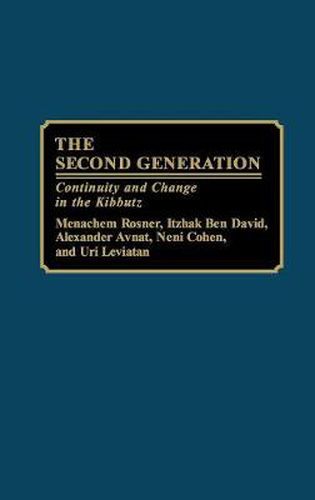Readings Newsletter
Become a Readings Member to make your shopping experience even easier.
Sign in or sign up for free!
You’re not far away from qualifying for FREE standard shipping within Australia
You’ve qualified for FREE standard shipping within Australia
The cart is loading…






The ideal of democratic socialist egalitarianism was put into practice by the kibbutz. These authors see it as the perfect laboratory for research on egalitarianism. Seeking an answer to the question, Can well planned democratic socialist egalitarian communities thrive economically, govern themselves effectively, and succeed in passing on their value system to successive generations?, The Second Generation presents extensive and systematic research conducted, between 1969 and 1976, by the Givat Haviva Institute for Social Research and the Research Institute of Ichud. Hakvutzot Vehakibbutzim (now part of TAKAM). This study addresses itself primarily to continuity and to a comparison of values and goals between founders and second generation Kibbutz members, while it sheds equal light on many other issues. Its extensive data and rich theoretical discussion will be a valuable resource for social and political scientists as well as moral philosophers.
This is a critical study of second generation kibbutz members, their status, personal aspirations, relationship to the kibbutz, their philosophy of life, and their attitude toward the first generation. The future of the kibbutz movement is dependent on answers to these questions–on whether or not the second generation is satisfied with its home. Fourteen essays ask such questions as: How does the second generation define itself in regard to national identity? What are their roles in effecting changes? Are they prepared to forego communal values for the sake of rapid economic progress? Did their kibbutz education prepare them to defend these values? This study’s principal concern is to determine the factors that will predict if second generation kibbutz members will remain in their kibbutzim. The book concludes with a theoretical model for predicting attachments.
$9.00 standard shipping within Australia
FREE standard shipping within Australia for orders over $100.00
Express & International shipping calculated at checkout
The ideal of democratic socialist egalitarianism was put into practice by the kibbutz. These authors see it as the perfect laboratory for research on egalitarianism. Seeking an answer to the question, Can well planned democratic socialist egalitarian communities thrive economically, govern themselves effectively, and succeed in passing on their value system to successive generations?, The Second Generation presents extensive and systematic research conducted, between 1969 and 1976, by the Givat Haviva Institute for Social Research and the Research Institute of Ichud. Hakvutzot Vehakibbutzim (now part of TAKAM). This study addresses itself primarily to continuity and to a comparison of values and goals between founders and second generation Kibbutz members, while it sheds equal light on many other issues. Its extensive data and rich theoretical discussion will be a valuable resource for social and political scientists as well as moral philosophers.
This is a critical study of second generation kibbutz members, their status, personal aspirations, relationship to the kibbutz, their philosophy of life, and their attitude toward the first generation. The future of the kibbutz movement is dependent on answers to these questions–on whether or not the second generation is satisfied with its home. Fourteen essays ask such questions as: How does the second generation define itself in regard to national identity? What are their roles in effecting changes? Are they prepared to forego communal values for the sake of rapid economic progress? Did their kibbutz education prepare them to defend these values? This study’s principal concern is to determine the factors that will predict if second generation kibbutz members will remain in their kibbutzim. The book concludes with a theoretical model for predicting attachments.